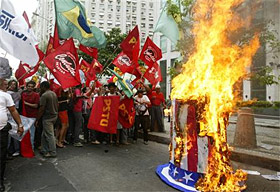 |
 |
 |
 News from Around the Americas | November 2005 News from Around the Americas | November 2005  
Thousands Protest Bush in Argentina
 Mary Milliken & Kevin Gray - Reuters Mary Milliken & Kevin Gray - Reuters


| | Student protesters burn a hat of Uncle Sam in front of the U.S consulate during a protest against an upcoming visit by President Bush in Rio de Janeiro. (Reuters/Bruno Domingos) |
Mar Del Plata, Argentina - Anti-U.S. demonstrations at the Americas Summit turned violent on Friday as protesters set fire to a bank, looted stores and battled riot police blocks from a luxury hotel where U.S. President George W. Bush met with regional leaders.

The violence came hours after tens of thousands of demonstrators took to the streets shouting "Get out Bush!" in a peaceful protest against the U.S. leader, who is unpopular among many Latin Americans who oppose the Iraq war and his push for a regional free trade deal.

But as the leaders' summit opened, several hundred protesters shattered storefronts and fought pitched street battles with riot police, who responded by firing tear gas and rubber bullets.

Masked protesters torched an Argentine bank branch and an office for Argentine telecommunications company Telefonica, hurling Molotov cocktails before hauling off computers and office furniture. Interior Minister Anibal Fernandez said at least 64 people were arrested.

The two-day meeting of Western Hemisphere leaders is expected to be a showdown over differing views on free trade between the American president and Venezuelan leader Hugo Chavez.

Chavez, a leftist and vocal critic of U.S.-backed free-market economic policies, vowed to work to defeat the stalled Free Trade Area of the Americas, or FTAA -- a key Bush administration plan to expand trade in the region.

"Every one of us has brought a shovel, an undertaker's shovel, because here in Mar del Plata is the tomb of FTAA," Chavez told a packed stadium, where protesters participated in an alternative People's Summit organized by anti-free trade activists.

Chavez was joined by Argentine soccer legend Diego Maradona, who carried the flag of communist Cuba and wore a T-shirt emblazoned with a picture of Bush under the words, "War Criminal." Bolivian indigenous leader Evo Morales, front-runner for the December 18 presidential election, was also on hand.

POLICIES OF PAST FAILED

Marchers urged the region's leaders to pursue alternatives to the U.S.-backed free-market recipes, which dominated in the region in the 1990s but failed to reduce poverty and inequality.

Argentine President Nestor Kirchner echoed Argentines' anger with the policies of the past as he opened the summit.

"We criticize the policies because we saw the results in Argentina's crisis in 2001 and the fall of various democratic governments in the region," said Kirchner, with Bush and the other leaders looking on.

In Buenos Aires, several thousand people also marched on a downtown plaza protesting Bush's visit. A smaller demonstration was held in the Uruguayan capital of Montevideo, where police said marchers shattered a McDonald's storefront.

Outside of the Middle East, South America may be one of the most hostile places to U.S. policies, despite Bush's vows upon taking office that it was a top foreign policy priority.

Many in the region feel Washington meddled too much in the past in economics and politics, then ignored the region to focus on the war on terrorism.

While the emerging markets of Asia have roared ahead in the last 20 years, Latin America's economies, rich with minerals, gas and farmland, fell into a cycle of boom and bust.

For many in the streets, free trade is not the way forward. "These deals are always tilted in favor of global powers," physical therapist Ramon Saracho said as he marched.

Washington hopes to win a commitment to revive talks for the FTAA in 2006, after opposition from Latin America's big economies over U.S. agriculture subsidies blocked it this year.

Chavez's opposition is not enough to block a deal, but he may pose a threat to reaching a consensus statement on the trade agreement at the summit.

Bush arrives at the meeting with his popularity at home sinking further. For the first time in his presidency, a majority of Americans questioned his integrity as his approval ratings on key issues fell to new lows, in an ABC News/Washington Post poll.

Additional reporting by Steve Holland and Tabassum Zakaria in Mar del Plata, Juan Bustamante in Buenos Aires and Patrick Markey in Caracas. | 
 | |
 |



